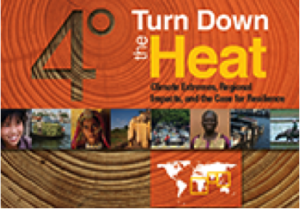Climate Change / Changing Climate
Climate Change
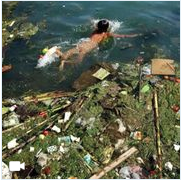 Climate Change & Tropical Glaciers: Managing Risks for H2O
Climate Change & Tropical Glaciers: Managing Risks for H2O
Marie-Ange Baudoin – Final Project for the World Bank’s 2014 MOOC, Turn down the heat.
This presentation focuses on glacier melt in tropical regions, especially in the Andes. Tropical glaciers across the world are important sources of fresh water for the mountain communities, for those located at mid-altitude, and for the lowlands and coastal areas. For instance, water from glaciers melt is used in food- and cash- crop production, hydropower, and industry. With constant glaciers retreat resulting from global warming, water availability from the highlands to coastal areas will be reduced, possibly increasing tensions over competing water demands and allocations. Therefore, it is important to foster cooperation among highlanders to lowlanders, in order to manage water resources in more sustainable ways.
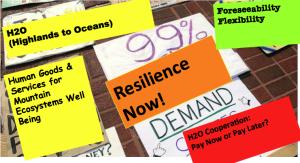
Climate Change Impacts, Resilience and Development in Mountain Regions. A PowerPoint presentation presented at the United Nations Mountain Partnership side event January 8, 2014. Presented by Ivan Ramirez and Michael Glantz.
Turn down the heat says the World Bank in a recent report on climate extremes, poverty and resilience.
Recent reports have highlighted new evidence of climate change impacts on our society; proof of human contribution to global warming is now presented as extremely likely (95% of likelihood according to IPCC’s Fifth assessment report).
Last year, the World Bank published a 2-parts report, Turn down the heat: climate extremes, regional impacts and the case for resilience, which warns us about the significant risks of a 4 degrees Celsius warmer world. This non-so-fictional possibility could become our reality by the end of this century, in a “business as usual” scenario (no concrete actions to avoid such consequences are taken). The report also looks at the already significant consequences of a 2 degrees temperature warming on important sectors such as agricultural production, coastal development and water resources. It should be noted that the UN, despite concerns of climate-sensitive regions such as small island states, has agreed to limit rise in temperature to 2 degrees, a warming that could be reached within the next 3 decades, says the World Bank.
“We must limit global temperature rise to 2 degrees. We are far from there, and even that is enough to cause dire consequences. If we continue along the current path, we are close to a 6 degree increase”. (UN Secretary-General Ban Ki-moon)
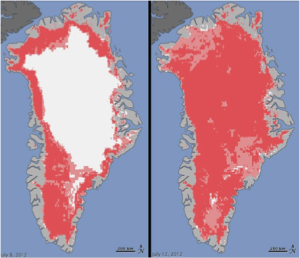 Among the impacts of climate change in a 2 to 4 degrees warmer world, the World Bank’s Turn down the heat report emphasizes risks on food security and food shortage, especially in developing countries. Increased poverty and poverty traps are presented as likely consequences of a 2 degrees rise in temperatures. Other impacts across the world include more extreme weather events, widespread food shortage, more frequent and intense heat waves and coastal flooding link to sea level rise.
Among the impacts of climate change in a 2 to 4 degrees warmer world, the World Bank’s Turn down the heat report emphasizes risks on food security and food shortage, especially in developing countries. Increased poverty and poverty traps are presented as likely consequences of a 2 degrees rise in temperatures. Other impacts across the world include more extreme weather events, widespread food shortage, more frequent and intense heat waves and coastal flooding link to sea level rise.
More on these topics can be found on http://www.worldbank.org/en/topic/climatechange/publication/turn-down-the-heat-climate-extremes-regional-impacts-resilience
The World Bank report Turn down the heat can be downloaded here: http://www-wds.worldbank.org/external/default/WDSContentServer/WDSP/IB/2012/12/20/000356161_20121220072749/Rendered/PDF/NonAsciiFileName0.pdf
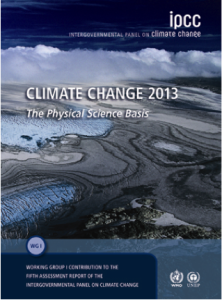 Additional support and insights in the climate science are available in the IPCC’s Fifth assessment report. Report from the Working Group 1 (WG1) on Climate Change: the physical science basis 2013 has been released, and emphasizes new evidence of changes in climate patterns, sea level rise and human influence on global warming. Reports of WG2 (on Impacts, Adaptation and Vulnerability) and WG3 (on Mitigation) are expected to be released in March & April 2014. Keep an eye on recent IPCC publications and new releases on http://www.ipcc.ch.
Additional support and insights in the climate science are available in the IPCC’s Fifth assessment report. Report from the Working Group 1 (WG1) on Climate Change: the physical science basis 2013 has been released, and emphasizes new evidence of changes in climate patterns, sea level rise and human influence on global warming. Reports of WG2 (on Impacts, Adaptation and Vulnerability) and WG3 (on Mitigation) are expected to be released in March & April 2014. Keep an eye on recent IPCC publications and new releases on http://www.ipcc.ch.
To update your knowledge on climate change (processes, causes, impacts and solutions), visit the World Bank’s first Massive Open Online Course (MOOC) on climate change, that has been launched on January 27. This course presents the most recent scientific evidence and some opportunities for urgent actions on climate change. Spread over 4 weeks, the course includes instructional videos and cutting-edge research documentations to read. Each week is concluded by a quiz and a peer-reviewed assessment. To receive a Statement of Accomplishment, all readings, videos and activities must be undertaken. The course is divided into 2 tracks to chose from, based on your personal interest: (1) climate champion and (2) policy leadership.
Additional information, materials and registration can be found here:https://class.coursera.org/warmerworld-001/wiki/Homepage
